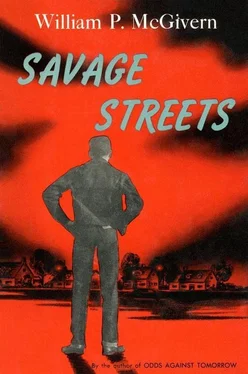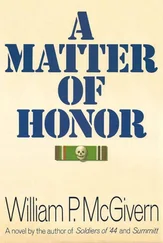Farrell saw that this was true; the hard, glazed surface of paint was cracking here and there, going pulpy under the soft pressure of the brush.
“I’ll be through by supper,” Norton said, in a cheerful, contented voice. “When I’m down to the wood I’ll put on a coat of white paint and then rub that off in a hurry before it gets dry. That gives the wood a streaky, limed look. Then I’ll rub it down with linseed oil to bring up a nice warm glow.”
“Well, that’s better than my method,” Farrell said.
“I’ll give you a hand some evening if you like,” Norton offered. “With the two of us working we could get quite a lot done.”
“You enjoy this, don’t you?”
“Well, I don’t mind it, put it that way.” Norton smiled at Farrell. “When I’m worried about something, you know, a problem at the bank maybe, I find that a few hours of work like this helps me to forget all about it.” He paused, frowning slightly then, and looked at Farrell. “What did you think about that business at the Detweillers?”
“It seems to me Det is talking up a big mess of trouble. And that’s what I came over to see you about. What was your reaction?”
“I’m not sure I know. Maybe that’s why I decided to come down here and go to work this afternoon. I feel kind of stirred up inside. I’m worried, I guess. My home and family are all I’ve got, and naturally I don’t want anything to happen to them.”
“Naturally,” Farrell said. “But we aren’t going to solve anything Det’s way.”
“That’s not what’s bothering me.” Norton made a restless gesture with his hand. “As far as going out and beating up those kids, well, that’s idiotic. And I’m not sure Det was really serious about it. But the way Chicky was making a play for Baldwin disturbed me. She kind of cut herself loose from her husband, it seemed. It was like she was announcing to every man in the room that she was ready for some kind of action.”
“Oh, I don’t know,” Farrell said. The turn of the conversation surprised him, and he felt his face becoming warm. “She likes to show off occasionally, that’s all it amounts to.”
“Well, that makes it worse,” Norton said, rather grimly. “What’s she trying to do? Stir people up for the fun of it?”
“She doesn’t bother me,” Farrell said, smiling.
“That’s different.” Norton paced the floor and rubbed the back of his neck with his hand. “She knows Janey’s pregnant, I presume. So why doesn’t she lay off? I mean, doesn’t she know the score? She makes it damn plain that she’s around, is what I’m trying to say. The other night she asked me to tie her apron on when we were alone in the kitchen. And when she was leaving here the other day she couldn’t get into her boots because she had high heels on or something, and it was me she called on for help.” Wayne picked up the paint brush and began working vigorously on the chest. He was quite pale. “Maybe I’m just imagining things,” he said. “I guess I sound like a soldier in a barracks waiting for a furlough.” He nodded at the surface of the chest. “See how it’s coming off now? No nibbing, no sweat at all. You know, we might get at some of your furniture tonight, if you’re not doing anything.”
“I don’t know what Barbara’s got planned,” Farrell said. “Let me check, and I’ll give you a ring.”
“Okay. My nights are pretty clear.”
Farrell left after another few minutes. The street was soft and drowsy with the Sunday afternoon stillness; sunlight dappled the trees and birds called aimlessly in the quiet air. Farrell went down the street and got into his car. He felt very sorry for Norton.
The Resnick home was old and graceless but its tiny plot of lawn was well-tended and the dark brown paint was fresh. The rest of the neighborhood was in decay; there were disorderly piles of rubbish at the curb, a tom overshoe, a tire, a pair of tattered overalls, empty paint cans, a section of canvas from the top of a convertible — a prideless collection, the sort of things most people would cart off to junk yards. The man who answered his knock was of medium height and thin except for a plump stomach that bulged as symmetrically as a basketball against his clean blue work shirt. He was freshly shaven, with sparse gray hair and rimless glasses which enlarged his dull but amiable gray eyes.
“Are you Mr. Resnick?”
“That’s right.” The voice was dry and strong. “What can I do for you?”
“I’d like to see your son if he’s in.”
“Duke? No, he’s over at the golf course, I expect. Or at that club of his.” Mr. Resnick studied Farrell’s sweater and open shirt collar. “You’re not a cop, I guess.”
“No. My name’s Farrell. I live in Faircrest. Could I talk to you for a moment, Mr. Resnick?”
“Sure, come on in. I know Duke’s in some trouble. The police were here for him yesterday morning. But Mr. Garrity, he’s our committeeman, called and told me everything was all right. Kind of a mistake all around. You know Mr. Garrity? A fine gentleman, and that’s the Gospel.”
“Is it?” Farrell said.
“Indeed it is.”
The living room was tidy, impersonal, and severely clean. A framed picture of a lake at twilight hung above the high, blond wood mantelpiece, and beside what Farrell judged to be Mr. Resnick’s chair was a table supporting a stack of pulp magazines, a rack of pipes and a pound tin of tobacco.
“Just take a seat,” Mr. Resnick said. He laughed, his teeth unexpectedly strong and white in the commonplace face. “I just finished the housework so everything’s clean. Now what’s the trouble — the name is Farrell, you say?”
“That’s right.” Farrell told him what had occurred between their sons, but made his account as neutral as possible; he hadn’t come here to quarrel with Resnick.
But Resnick seemed neither concerned nor angry. He shook his head thoughtfully and said, “Well, Duke’s no angel, I guess. But then your boys wouldn’t say he was the one bothering them. Maybe it’s just all a mistake, like Mr. Garrity said.”
“That’s possible, of course. As far as I’m concerned, the damage has been done, and the thing now is to prevent any more trouble. Some of my friends, to put it bluntly, are mad as hell about what’s happened, and if there are any more incidents they’re just likely to do something violent and foolish.” Farrell paused to light a cigarette. He found Mr. Resnick’s polite but noncommittal interest a bit disconcerting; he had a feeling Resnick would listen with about the same emotion to a discussion of the weather. “I don’t know your son at all, Mr. Resnick,” he went on. “I’ve only seen him twice, and I haven’t had a chance to talk with him. Perhaps he’s a bit wild, but that’s part of growing up, don’t you think?”
“Well, I guess so.” Mr. Resnick was filling a pipe, his fingers working with the deftness of long habit. “Some kids are wild, and others just go along nice and easy. It’s funny.”
“Was Duke a difficult boy to raise?”
“Difficult? Well, no. Actually he sort of raised himself, you might say.” With his pipe drawing well Mr. Resnick became more expansive. “I’m the boy’s stepfather, see. I married his mother when he was just two. She died four years later, and I had the whole job to myself then. But he wasn’t any trouble. He didn’t like other people doing for him. He was independent, you could say. For instance now, he didn’t like me to fix his meals, and that was lucky because I was working every day in the switching yards. And he didn’t like me to put him to bed or fuss over him. No, you couldn’t say he was any trouble.”
“How did he do in school? Does he have any particular ambitions?” Farrell smiled. “I hope you don’t mind these questions. I think if I knew him better I could talk to him.”
Читать дальше












